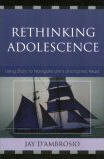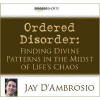 Fearing for Loved Ones
Fearing for Loved OnesThe mighty prophet Teiresias at last revealed himself to Odysseus and drank his fill of the spilled blood. The prophet provided his counsel, cautioning that Poseidon’s anger had yet to be assuaged. He predicted that Odysseus would lose the whole of his crew, along with his ship, to the terrors of the sea and would return alone to shores of Ithaca. There, Teiresias declared, he would realize that the men of Ithaca who wanted to marry his wife Penelope had overrun his home, devoured all sustenance, and abused his son. Hearing this declaration by the sightless oracle, Odysseus was awash with fear—the fear of losing those he held most dear to his heart.
Fear and Dread are the ogres that often haunt the steps of the adolescent who becomes brutally aware of the mortality of loved ones. Those who care about students such as these must learn to smite such foes. They are enemies who would attempt to ensnare a life that could be lived in freedom.

When disaster strikes someone close to us, it is natural to feel worried about others that we love. The sudden realization that all human beings are mortal can be very unnerving for a young person. Thoughts such as “Will my mother die?” or “Will my brother be hurt?” can cross an adolescent’s mind with startling frequency. A student affected by another’s death may appear to be fine on the outside, but inside they are often grieving. They are fearful of experiencing this type of loss again in perhaps an even more personal and devastating way.

If you suspect that a young person is struggling with fears such as this, it is helpful to arrange for a private meeting. There, in an environment of caring and confidentiality, the student can share what is really on his mind. Allow the student to share with little input from you. Simply listen. Sometimes the best thing we can do for a young person in this situation is to be a listening ear.
If she is reluctant to divulge her thoughts concerning her fears and worries about the future, you may want to ask her to write her concerns on a piece of paper or in a journal. This is another grounding technique that allows an individual to take an abstract and thus powerful fear and make it concrete and tangible. Writing reduces intangible fears to something that is manageable. The student can look at the list and say, “So this is what I’m afraid of.” The rational mind is allowed to intervene and determine if the fears are worth having or if they are in fact irrational. A piece of paper and a pencil seem innocuous, but they are in reality very strong weapons against Fear and Dread. The pen is mightier than the sword. It is true that we will all lose those we love, but a life lived in fear of such loss is no life at all.
Labels: dread, fear, freedom, mortality, Odysseus, Poseidon, Teiresias
 Fearing for Loved Ones
Fearing for Loved Ones
 If you suspect that a young person is struggling with fears such as this, it is helpful to arrange for a private meeting. There, in an environment of caring and confidentiality, the student can share what is really on his mind. Allow the student to share with little input from you. Simply listen. Sometimes the best thing we can do for a young person in this situation is to be a listening ear.
If you suspect that a young person is struggling with fears such as this, it is helpful to arrange for a private meeting. There, in an environment of caring and confidentiality, the student can share what is really on his mind. Allow the student to share with little input from you. Simply listen. Sometimes the best thing we can do for a young person in this situation is to be a listening ear.

 The first ghost that appeared to Odysseus was that of one of his own sailors, Elpenor, who had died when he fell off the roof of Circe’s palace. He spoke regretfully of the drunken state that had caused him to stumble and fall to his doom. Elpenor entreated Odysseus to give him a proper burial lest his spirit torment the king’s days and haunt his steps. Odysseus swore an oath to provide a suitable wake for his fallen comrade.
The first ghost that appeared to Odysseus was that of one of his own sailors, Elpenor, who had died when he fell off the roof of Circe’s palace. He spoke regretfully of the drunken state that had caused him to stumble and fall to his doom. Elpenor entreated Odysseus to give him a proper burial lest his spirit torment the king’s days and haunt his steps. Odysseus swore an oath to provide a suitable wake for his fallen comrade.






